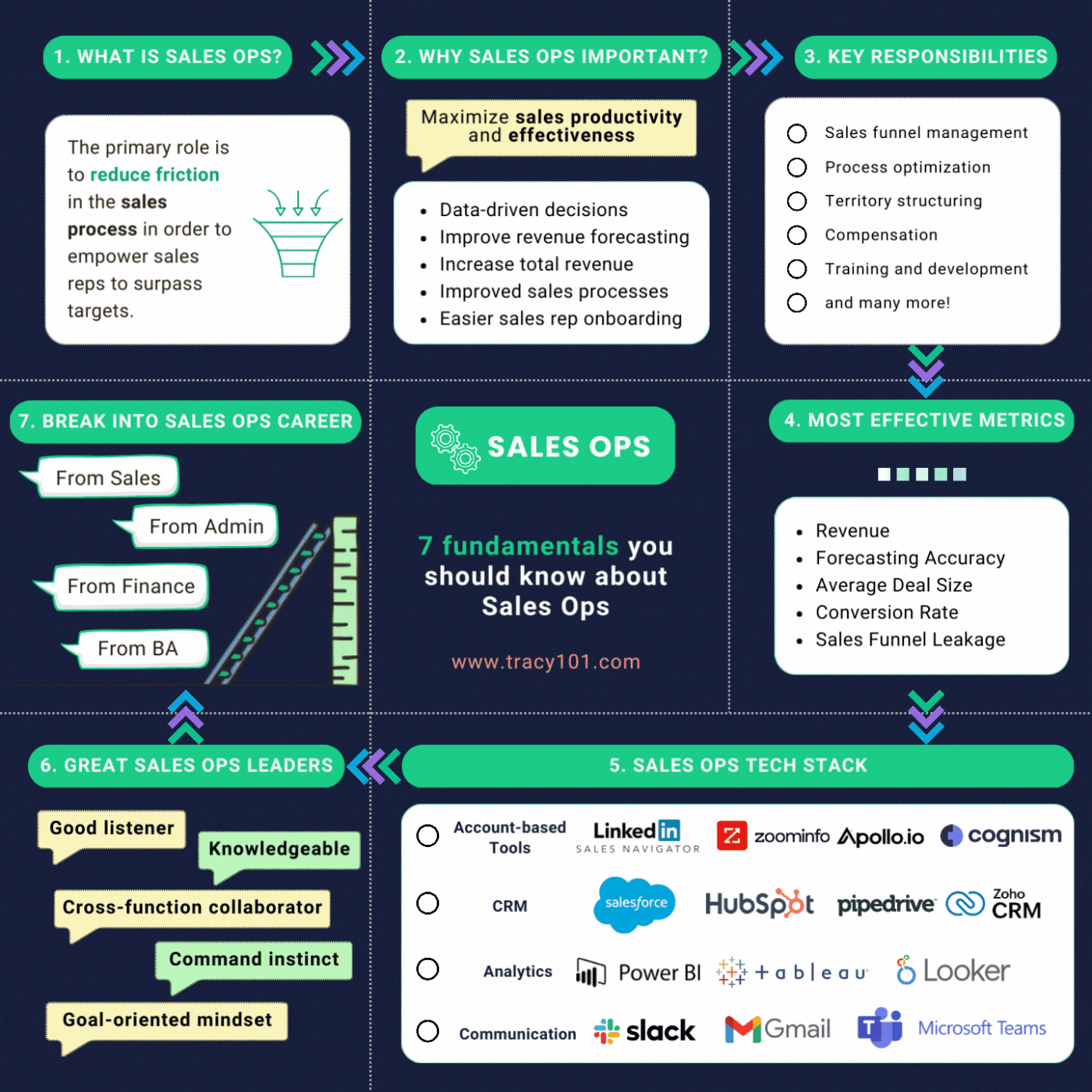Breaking into a Sales Operations role
7 fundamentals you should know about Sales Ops
After reading the ebook "The Sales Ops Handbook" by Ebsta, I found it quite interesting and practical. It's based on real interviews with 25 high-level professionals in the sales operations field.
As someone who's been a Sales Ops professional for 3 years before becoming a Revenue Operation Manager and then Director, I've picked the 7 most crucial fundamentals about Sales Ops from the ebook.
1 - What is Sales Ops?
The primary role of sales ops is to reduce friction in the sales process, empowering reps to hit and surpass their targets.
2 - Why is Sales Ops important?
While sales ops employees typically work behind the scenes to support the customer-facing sales team, they play a vital role in identifying performance levels and meeting important benchmarks by maximizing sales productivity and effectiveness.
3 - Key responsibilites?
Sales ops encompasses numerous support functions for the customer-facing sales team, including training and development, creating compensation schedules, lead management, territory structuring, process optimization, and many other activities.
4 - Most effective metrics to use
4.1 - Revenue: The cornerstone Key Performance Indicator (KPI) in sales operations, revenue is meticulously broken down into three critical components: new business acquisition, upsell/cross-sell opportunities, and renewal percentages. This comprehensive breakdown allows for a nuanced understanding of revenue streams and their respective contributions to overall financial performance.
4.2 - Forecasting Accuracy: A pivotal metric that significantly enhances productivity by enabling sales representatives to concentrate their efforts on high-quality leads. Accurate forecasting empowers the sales team to make well-informed decisions, optimize resource allocation, and strategically plan for future growth. It also provides valuable insights for inventory management and financial planning.
4.3 - Average Deal Size: This crucial metric is derived by dividing the total deal value by the number of deals closed within a specific period. It offers invaluable insights into contract trends, customer buying patterns, and the overall health of the sales pipeline. Tracking average deal size over time can reveal shifts in market dynamics, product positioning effectiveness, and sales team performance.
4.4 - Conversion Rate: A fundamental metric that aids in determining the volume of leads required to achieve revenue targets. By analyzing conversion rates at various stages of the sales funnel, teams can identify bottlenecks, optimize their sales process, and implement targeted strategies to improve overall conversion efficiency. This metric is essential for resource planning and setting realistic sales goals.
4.5 - Sales Funnel Leakage: This critical analysis identifies precisely where prospects disengage from the sales funnel by meticulously monitoring conversion rates at each stage of the process. By pinpointing these dropout points, sales operations can implement targeted improvements, refine the sales approach, and enhance the overall customer journey. This data-driven approach enables continuous optimization of the sales process, ultimately leading to higher conversion rates and increased revenue.
5 - Sales Ops tech stack
In the book, Ebsta categorizes the tech stack into 10 categories:
Account-based Sales and Marketing Tools
CRM
Analytics
Communication
Email
Sales Intelligence
Sales Engagement
Contract Lifecycle Management
Lead Gen
Performance
I'll choose the 4 most popular categories and include their names so you can get an overview of what tech stack a Sales Ops professional should be familiar with.
6 - Competencies of great Sales Ops leader
6.1 - Good listener
Many sales ops leaders make the mistake of not listening to others and dismissing their ideas. To be effective, you must listen to stakeholders and partners, and communicate in a way everyone can understand.
6.2 - Knowledgeable
A sales ops leader who lacks understanding of the sales process struggles to hire, train, and evaluate staff effectively. While prior sales experience isn't essential, experts agree that a top-notch sales ops leader must thoroughly comprehend the sales process.
6.3 - Cross-functional collaborator
Cross-collaboration is crucial for sales ops leaders. They must work seamlessly with various departments—from product to engineering, legal, and finance. This collaboration ensures the customer remains at the heart of your business model, with all departments providing support.
6.4 - Command instinct
As a sales ops leader, your position grants you power that requires judicious use. Key sales metrics—such as quota attainment, average deal size, conversion rate, and forecasting accuracy—can measure team performance and foster accountability. This "command instinct" isn't about autocracy; it's about driving continuous improvement. Start by praising high achievers and coaching underperformers to eliminate complacency.
6.5 - Goal-oriented mindset
An effective sales ops leader must be goal-oriented and "understand the heartbeat and rhythm of their company." You should grasp both your company's current objectives and its future aspirations.
7 - Breaking into a Sales Ops career
The good news is that roles in sales ops embrace a wide variety of skills, education levels, work experiences, and personalities. There are several possible routes to a career in sales ops. We've cataloged how some of the most successful executives, managers, and associates began their journeys:
From Sales
From Administration
From Finance
From Business Analysis
Final thought
Sales ops is a field that offers many exciting career opportunities to aspiring entrepreneurs, managers, and executives. Breaking into a career in sales ops requires hard work and perseverance, but the reward is well worth it.
Hey there! If you drop a heart icon or leave a comment,
it would really inspire me to keep writing :d




